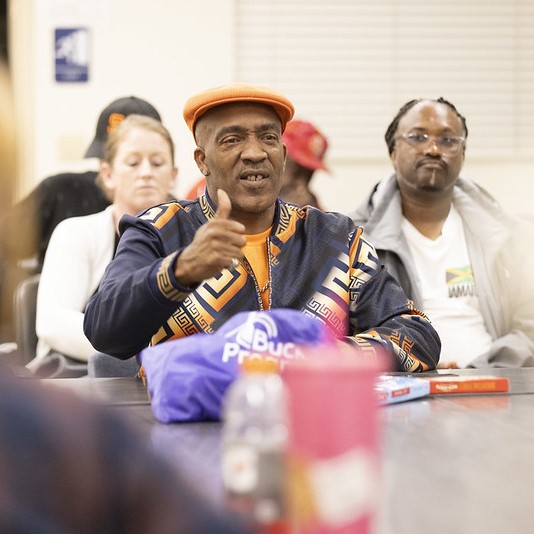
Taylor’s life changed when he decided to leave his old identity behind. Born Anthony Taylor, he grew up answering to Anthony and Tony. But neither felt right after he decided to turn his life around.
“Anthony and Tony were the guys using drugs, crashing cars, going to jail,” he explains. “When I got sober seven years ago, I decided to go by Taylor. Taylor’s the guy doing the right thing, the guy you can depend on.”
Taylor’s journey began in Sedalia, Missouri – a once-segregated city divided by railroad tracks that brought prosperity to some and symbolized inequality to others. Seeking a better life, his family moved to Iowa when Taylor was 12. However, he felt even more isolated. He and his brother were among just four Black students in a school of 1,500. Bigotry and name-calling were constants.
“I was 12 the first time I tried alcohol and weed,” Taylor says. “I felt like I didn’t fit in, but when you’re smoking and drinking with the guys, suddenly everyone loves you. That’s where I found my comfort zone.”
At 19, Taylor moved to the Bay Area to escape Iowa’s harsh winters. His substance use came with him, escalating from cheap wine and weed to crack and meth. “Someone told me if I tried meth, I’d stop using crack. They were right,” he says wryly. “But meth brought a whole new level of destruction to my life.”
aylor hustled for cash, lived in cheap motels or cars, got arrested, did jail stints, and went to court-ordered detox/rehab facilities. He achieved sobriety a few times, at one point staying sober for nearly three years. Those were good times; he got a job at Starbucks, became a manager, and even helped hire and train others who had graduated from a local recovery program.
But sobriety often slipped away. “I’d been using drug and alcohol for 48 years. It was the life I settled for, telling myself ‘at least I’m still alive.”
One day, during a six-month sober period, Taylor got into his old Toyota station wagon – his home at the time – to drive to Target. Instead, he found himself visiting the group he used to get high with.
A line of meth later, Taylor was speeding down the freeway at 60 mph and hallucinating that police cruisers were chasing him. Weaving in and out of traffic, he lost control and slammed into a concrete median. Amazingly, Taylor walked away with only a broken arm.
In that defining moment, he decided to get off the drug-fueled merry-go-round. After his release from jail he called the Helen Vine Recovery Center, a detox and residential treatment center operated by Buckelew. Helen Vine had no available beds. Taylor kept calling until, eight days later, there was an opening.
A five-day detox turned into a 120-day stay that gave him the structure and support to rebuild his life: “I needed every single one of those 120 days to get my thoughts straight and put enough distance between myself and my last use to feel stable.”
By the time Taylor left Helen Vine, he had more than just sobriety. He had a job, a Section 8 housing voucher and a new sense of purpose. He moved into a small apartment in Mill Valley and began working steadily in food service and catering. Keeping his promise to return as a volunteer, Taylor took a bus from Mill Valley to San Rafael every Sunday to attend alumni gatherings. Staying connected to this tight-knit alumni group has been a key to his continued sobriety.
“Helen Vine feels like home,” he says. “The people there know me better than anyone else because I’m honest, I participate, and I’ve set realistic goals.”
Taylor soon became a Registered Alcohol Drug Technician (RADT), working at Helen Vine for two years before returning to his first love – catering. Today, he works as a caterer three days a week and volunteers two days at Helen Vine, where he facilitates alumni groups and offers guidance to those still in treatment. He loves taking groups for nature walks in the open space nearby, appreciating how fresh air and movement help clients open up and “be real.”
“Helen Vine is different from any other program I’ve been in,” Taylor says. “They were there every step of the way – not judging me, but also not letting me get away with any B.S. They’re there for you, but they’re not going to work harder for you than you will for yourself.”
Seven years sober, Taylor remains committed to the life he’s built — one of service, honesty and stability.





